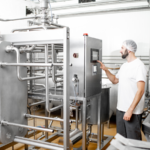Cleanrooms: Enhancing Quality and Safety in Food Processing
Cleanrooms in the food and beverage industry have become pivotal in enhancing product safety and extending shelf-life. Often associated with sectors such as pharmaceuticals and semiconductors, cleanrooms are designed to be controlled environments where contaminants like dust, airborne microbes, and aerosol particles are minimized. This article explores the essential role these cleanrooms play in the food and beverage sector, shedding light on their specific applications and benefits.
Bakeries and Cleanrooms: A Recipe for Success
Firstly, cleanrooms in the food and beverage industry are the unsung heroes in food processing environments, such as bakeries. For example, a global leader in the baking industry, Bimbo Bakeries USA, uses cleanrooms to control airborne particles and prevent product contamination. This has not only led to improved product quality but also enhanced safety for consumers, offering a competitive edge in the market.
Brewing Consistency: Cleanrooms in the Beverage Industry
Similarly, cleanrooms are integral to beverage production facilities. One outstanding example is in the brewing industry, especially in the craft beer segment. The yeast propagation process, a critical phase in brewing, is often conducted in cleanrooms to prevent contamination from wild yeast strains and bacteria. This ensures the consistency of the brew, maintains the unique taste profile, and reduces the chances of batch loss.
Dairy Industry: Cleanrooms and Cheese Production
The dairy industry has also embraced cleanrooms, particularly in the area of cheese production. Considering that cheese is a fermented product, it is susceptible to unwanted microbial activities that could compromise its quality and safety. With cleanrooms, cheese factories, like Tillamook in Oregon, can control the environment in which the cheese matures, minimizing the risk of contamination and maintaining the consistent flavor that the brand is known for.
The Sweet Success of Cleanrooms in the Chocolate Industry
Next, let’s take a look at the chocolate industry, where cleanrooms have been a game-changer. For popular companies like Hershey’s and Nestle, cleanrooms are used to maintain a strictly controlled environment. This helps reduce the chances of chocolate bloom – a whitish coating that can form on the surface of chocolate due to changes in fat and sugar crystals – thereby extending the product’s shelf-life and ensuring a smooth, glossy finish that is deliciously appealing to consumers.
Emerging Market of Plant-Based Meats and Cleanrooms
In addition, cleanrooms are pivotal in the emerging market of plant-based meats. Innovative companies like Beyond Meat and Impossible Foods utilize cleanrooms to conduct essential research and development. The clean, controlled environment is crucial for cultivating plant proteins in lab conditions, ensuring that the end product is safe, nutritious, and flavorful.
Cleanrooms: A Worthwhile Investment
While the use of cleanrooms may seem like an additional expense for manufacturers, the benefits they bring – from improved product quality to increased consumer trust – make them a worthwhile investment. As more consumers become aware of food safety and quality issues, the use of cleanrooms in the food and beverage industry is likely to become even more prevalent.
Conclusion: Cleanrooms in the Food and Beverage Industry – A Revolutionary Step
In conclusion, cleanrooms in the food and beverage industry are helping revolutionize the way these products are made. From bakeries to breweries, from dairy to chocolates, and even in the burgeoning market of plant-based meats, cleanrooms play a pivotal role in maintaining high standards of quality and safety. As this industry continues to evolve, cleanrooms will remain at the forefront, ensuring we can enjoy our favorite food and drinks without any qualms about their safety or quality.
Key Takeaway: Cleanrooms and their Indispensable Role
Cleanrooms have emerged as an integral part of the food and beverage industry, helping brands maintain product consistency, enhance shelf-life, and assure safety, thereby delivering superior quality products to consumers.
